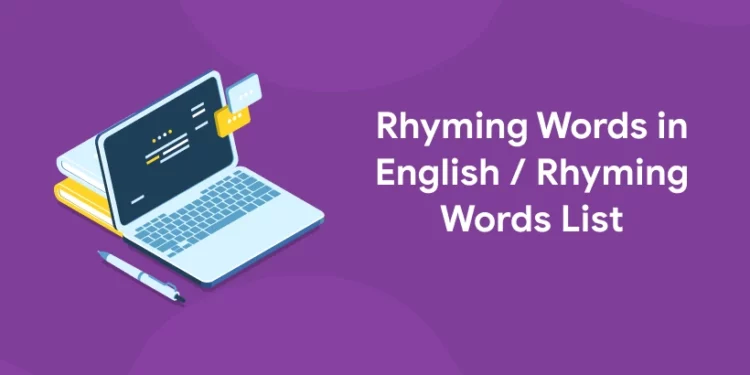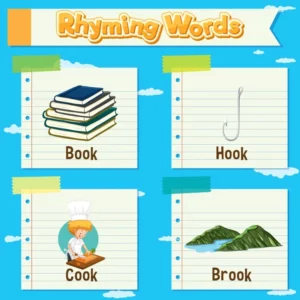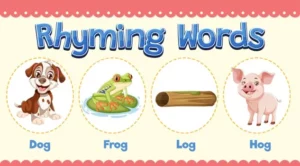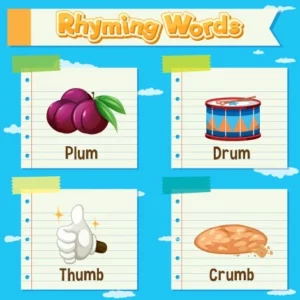Table of Contents
Key Takeaways:
- Rhyming words are defined by shared ending sounds that enhance memorability and language flow.
- Recognizing rhymes improves vocabulary, pronunciation, creativity, and keeps learning engaging.
- Poems, songs, and storytelling depend on rhymes to create rhythm, mood, and emotional impact.
- Practical exercises like poetry writing and flashcard use deepen your command of rhyming words.
- Entri’s courses provide comprehensive spoken English and personality development training to build confidence and career success.
Introduction
Have you ever found yourself humming a catchy tune or remembering a childhood poem effortlessly? The secret ingredient often lies in rhyming words—those pairs or sets of words that end with similar sounds. Rhymes weave a musical texture into language, making it enjoyable to listen to and easier to remember. They’re everywhere: from nursery rhymes that charm little ones to pop songs that top charts, rhymes help us connect with language deeply.
Whether you’re learning English, exploring poetry, or just curious about how words can dance together, understanding rhyming words opens a treasure chest of creativity and communication. In this detailed guide, you’ll discover not only what rhymes are but also their vital role in learning, creative expression, and communication. Plus, practical exercises and a comprehensive rhyming word list will help you master this fun aspect of English.
What Are Rhyming Words? Tips to Identify Rhymes
1: Which of the sentences below is grammatically correct?
Rhyming words are words that share the same ending sound from the last stressed syllable onward. It’s key to focus on the sound, not simply spelling. For instance, “blue” and “through” rhyme because they share the “-oo” sound at the end, even though they are spelled differently.
Tips to identify rhyming words:
- Listen for the vowel and consonant sounds at the end of words, especially from the last stressed syllable.
- Don’t be misled by spelling: “rough” and “cough” do not rhyme even if spelled similarly.
- Start with common rhymes: practice pairs like “light/night,” “cat/hat,” and “make/bake.”
- Practice with near rhymes: words that almost rhyme, like “shape” and “keep,” can help train your ear.
Understanding these basics will equip you to spot or create rhymes easily in poems, songs, or everyday speech.
| Free PDFs for download | |
Spoken English Course for Guaranteed Confidence and Career Growth
Spoken English Course by Entri App: Enhance your communication skills, gain certification, and boost your career with confidence.
Join Now!Why Rhyming Words Matter: Five Key Benefits
Rhyming isn’t just about fun sounds; it serves powerful learning and creative purposes:
| Benefit | Explanation |
|---|---|
| Enhance Memory | Rhymes form predictable patterns that make phrases easier to remember, aiding everything from language acquisition to advertising jingles. |
| Build Vocabulary | Encountering rhyming words introduces new, related words naturally, widening your skill without feeling like rote learning. |
| Foster Creativity | Rhyming pushes you to think inventively about word choices, encouraging poetic, lyrical, and playful uses of language. |
| Improve Pronunciation | Listening for and producing rhymes develops awareness of sounds, strengthening pronunciation and accent control. |
| Make Learning Fun | Integrating rhymes in study materials keeps learners engaged and motivated, especially young children or ESL learners. |
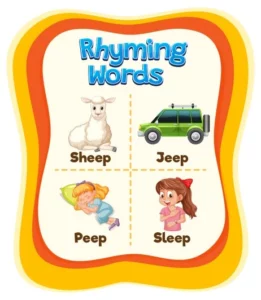
Extensive Rhyming Words List
Here is a comprehensive table of common and useful rhyming words to inspire your writing, learning, or teaching:
| Rhyming Group | Words |
|---|---|
| -at | cat, hat, bat, rat, mat, flat, chat, scat, brat, splat |
| -ight | light, night, fight, sight, bright, tight, flight, right, white, height |
| -ay | day, play, stay, way, say, bay, may, pay, lay, spray |
| -ore | more, store, door, floor, core, roar, score, before, adore, explore |
| -un | sun, run, fun, bun, gun, ton, spun, shun, begun, stun |
| -eep | deep, sleep, keep, steep, beep, sweep, cheap, leap, reap, heap |
| -ane/-ain | plane, rain, gain, pain, main, train, brain, chain, strain, explain |
| -ool/-ule | school, cool, pool, tool, rule, fuel, duel, cruel |
| -ove | love, glove, dove, above, shove, thereof |
| -alk | walk, talk, chalk, stalk, balk, squawk |
| -ick | pick, kick, lick, sick, quick, brick, chick, thick, flick |
| -eed | need, feed, seed, bleed, creed, speed, deed, proceed |
| -ing | sing, ring, king, wing, bring, swing, cling, fling, sting |
| -all | ball, call, fall, hall, mall, small, tall, wall |
| -ine | line, fine, mine, pine, shine, wine, dine, define, decline |
| -ear | near, fear, clear, dear, gear, year, tear, smear |
| -oom | room, bloom, gloom, zoom, boom, broom |
| -ash | cash, dash, flash, crash, trash, splash, stash |
| -ump | bump, jump, lump, pump, dump, slump |
| -elp | help, yelp, whelp |
How Rhyming Words Shape Poetry and Music
Poets and musicians structure language beautifully by employing rhymes. Here are key ways rhyme enhances their work:
- Rhythm and pattern: Rhymes establish a cadence that makes verses flow melodiously.
- Emphasis and unity: Repeated sounds highlight important themes or emotions, binding lines together.
- Memory aid: Catchy rhymes make songs and poems easy to memorize and recite.
- Emotional resonance: Rhymes can create mood and tone, whether playful, solemn, or dramatic.
Famous examples include Shakespeare’s sonnets, Dr. Seuss’s children’s books, and modern rap lyrics, each leveraging rhyme to captivate audiences.
Spoken English Course for Guaranteed Confidence and Career Growth
Spoken English Course by Entri App: Enhance your communication skills, gain certification, and boost your career with confidence.
Join Now!Practical Rhyming Word Exercises to Try
Engage your language skills with these interactive exercises designed to improve your understanding and use of rhyming words:
1. Fill-in-the-Rhyme Poem
Write a short four-line poem leaving the last word of each line blank. Then, choose rhyming words from the list below to complete it. Example:
“The sky is so ____, I like to ____. Birds sing in ____, Their songs make me _____.”
Choose from: bright, light, flight, night, kite.
2. Rhyming Word Match
Draw two columns—one with a list of words and the other with their rhymes shuffled. Match pairs by drawing lines or writing pairs. Example:
| Words | Rhymes |
|---|---|
| fan | plan |
| night | light |
| run | fun |
| call | ball |
| share | care |
3. Create Your Own Rhymes
Pick a simple word like “play” or “time” and write down as many rhyming words as you can within 2 minutes. Challenge yourself to use them afterward in sentences or poems.
4. Rhyming Word Quiz
From a group of four options, select the word that rhymes with the given word.
- Which word rhymes with “hat”? (mat, dog, fish, car)
- Which word rhymes with “moon”? (soon, pen, chair, bus)
5. Storytelling with Rhymes
In a group or solo, tell a short story or a few sentences where at least two sentences end with rhyming words.
These exercises improve your ability to recognize, recall, and creatively use rhymes in everyday English.
Entri’s Spoken English and Career Level-up Courses: Learn and Grow with Confidence
Mastering rhyme is a stepping stone in the broader journey of English fluency. To help learners progress effectively, Entri’s Spoken English Course offers well-structured sessions that focus on pronunciation, everyday conversations, and practical vocabulary usage to communicate confidently.
Alongside language skills, personal and professional development is crucial. The Career Level-up Personality Development Course dives into soft skills like body language, communication techniques, and confidence-building strategies to empower learners in their career paths.
Both courses are interactive, learner-friendly, and designed to provide not just knowledge but measurable improvement, helping you speak, connect, and succeed in diverse environments.
Conclusion
Rhyming words are not just poetic flourishes but essential building blocks that enrich language learning and creative expression. By exploring rhymes actively, you unlock better memory, sharper pronunciation, and enhanced creativity in English. To elevate your skills further and gain confidence in everyday speaking and professional settings, enrolling in Entri’s Spoken English and Career Level-up courses offers the perfect next step. These thoughtfully designed programs guide you through mastering communication and personality development, empowering you to thrive. Begin your journey with Entri today and experience how mastery of rhyme and language can open doors to exciting opportunities.
|
Related articles |
|
| Vegetable Names in English | |
Spoken English Course for Guaranteed Confidence and Career Growth
Spoken English Course by Entri App: Enhance your communication skills, gain certification, and boost your career with confidence.
Join Now!Frequently Asked Questions
What is a rhyming word?
Rhyming words have the same ending sound from the last stressed vowel onward, like “cat” and “hat” or “blue” and “true.” They create harmony in speech and writing.
Why are rhymes important for English learners?
Rhymes help memorize vocabulary, improve pronunciation, and make language learning playful and creative, especially for children and ESL learners.
How can I find rhyming words quickly?
Listening carefully to ending sounds and using online rhyming dictionaries or apps can help find rhymes easily.
What is the rhyme scheme in poetry?
A rhyme scheme is the ordered pattern of rhymes at the ends of lines, like AABB or ABAB, structuring poems and making them musical.
Can rhyming improve speaking skills?
Yes, practicing rhyming enhances sound awareness, making pronunciation clearer and speech more fluent.


